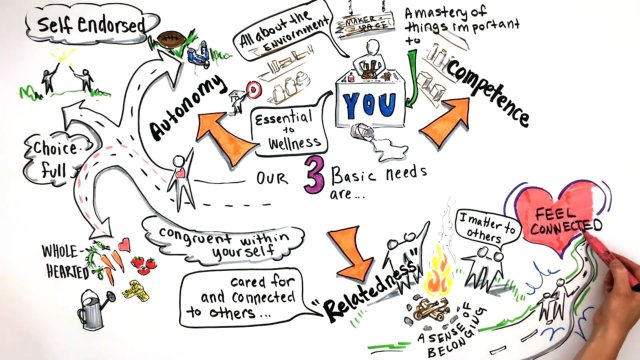HOW TO MOTIVATE STUDENTS IN ONLINE EDUCATION
Motivating students is important to take into account when you design and develop your instructional strategies. It is quite a change from daily face-to-face education to entirely online education. It might be that students feel insecure and lonely. What can you do to motivate your students at a distance?
WHAT DO WE KNOW ABOUT MOTIVATION?
One common used theory on motivation of this moment is the self-determination theory. This theory offers some insights that can be very useful to answer the question: How to motivate our students to study online?
With learning online or distance learning it is important to be intrinsically motivated. There is after all no one there, no teacher, no fellow students, to guide you and inspire you.
The Self Determination Theory (SDT) makes a distinguish between extrinsic and intrinsic motivation. Both are important in education. When extrinsically motivated you do something because you have to, e.g. pass an exam. Intrinsically motivated means you mainly do something because you want to, e.g. because you find it interesting. To intrinsically motivate people three things are important; relatedness, competence and autonomy.
1. RELATEDNESS - MAKE SURE STUDENTS FEEL SOCIALLY CONNECTED
Especially with online learning this can be hard. Invest in contact, e.g. short video’s with use of humor or something personal. Promote collaboration with en between students; online discussions, virtual classrooms, WhatsApp groups, and so on. Prevent that students feel lonely.
2. COMPETENCE - MAKE SURE STUDENTS FEEL COMPETENT
With this we mean that students feel capable about what they are doing and also feel that it is useful. What can be very helpful and is often forgotten in distance education, is to explain what the content is useful for and why. So why is it useful to look at a PowerPoint presentation or read an article.
Also prevent students from getting lost. Try to take into account their pre-knowledge. Guidelines out of the domain of explicit and direct instruction can be helpful. Make sure presentations are not too complicated or too long. Or that students have to switch between different media types and get lost. Also important is to give students regularly feedback. Especially in the situation of online learning you can miss the feeling of being on the right track.
3. AUTONOMY - MAKE SURE STUDENTS EXPERIENCE AUTONOMY.
It might feel a bit in contradiction with the guidelines about competence but that is not the case. Remember you can’t control your students at a distance. Better is to assume they find your content interesting and relevant. Avoid controlling language. Give when and where possible (and without making it confusing) options to your students. Make sure that assessment is experienced as supportive.
We can translate this to some tips en tricks. Most important is that you understand what intrinsic motivation is and that it is exactly that kind of motivation we especially need at the moment.
TIPS AND TRICKS
- Answer quickly to e-mails, questions and in online discussions if you use this (preferably within 24 hours). In this way students feel connected en competent: you know you are on the right track and that you are not alone.
- Make clear on a daily/weekly basis what is expected from students and what the planning is. And also important: why it is important to learn this. Ideally you make a video message so students have the idea of being connected.
- Give constructive and personalized feedback on assignments. Keep it friendly, constructive and clear. You can mean well but think about the position of the student. He or she also has to get used to the new situation and might not always experience it as friendly.
- Make sure that students have easy access to resources they need. Prevent them from getting lost and losing their feeling of competence.
- Try to vary in the content offer; texts, video’s, PowerPoints and discussion options. Even better is when students are able to choose: one student might prefer a digital lecture or podcasts while the other students likes to read. Being able to choose something can strengthen the intrinsic motivation.
- Work together with your colleagues so that everyone is using the same kind of technical tools. Online education otherwise can become a bit of a search for students and that can demotivate.
- Make use of clear examples, self-testing and other build in possibilities in the study material to guide your students.
- Show your involvement. Don’t hesitate to use some fun or something personal. Especially now we need to feel socially connected. It helps students to stay motivated.
- No one has asked for this situation. Try to see it as an adventure. If you show willingness to adjust things if something does not work, maybe we even get to solutions we never thought of.
And especially: let them know you are there as a teacher, and as a person and that you are involved en available despite the physical distance.
NB. This text is partly based on the text on the website of the Open University of Amsterdam.

